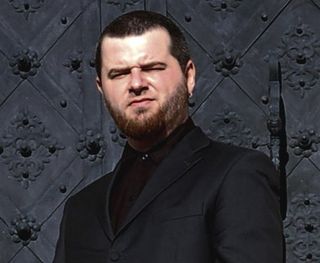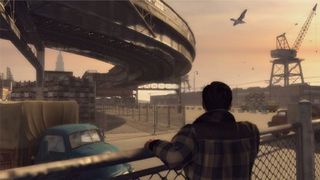Mafia II: The Interview
We look inside the criminal mind of writer/director Daniel Vavra for EXCLUSIVE insights into the game
We've covered Mafia II extensively over the last week, unveiling all sorts of exclusive new tidbits about the swank 1950s crime drama - but the real highlight was getting to chat with 2K Czech's Daniel Vavra, the game's writer and director, via e-mail. Vavra's script for the original Mafia: The City of Lost Heaven helped win the game critical acclaim and a cult following; with the sequel poised to dwarf it in size, scope and pretty much everything else, we took the opportunity to ask Vavra about what's in store.
We've covered Mafia II extensively over the last week, unveiling all sorts of exclusive new tidbits about the swank 1950s crime drama - but the real highlight was getting to chat with 2K Czech's Daniel Vavra, the game's writer and director, via e-mail. Vavra's script for the original Mafia: The City of Lost Heaven helped win the game critical acclaim and a cult following; with the sequel poised to dwarf it in size, scope and pretty much everything else, we took the opportunity to ask Vavra about what's in store.

Above: Daniel Vavra's a slicker dresser than most of his characters - which, considering they're all old-school mobsters, is saying quite a lot.
GamesRadar: Going by what we've seen so far, Mafia II seems to have a lot of small similarities with Grand Theft Auto IV: the versatile car trunks, the seamless interiors, the lifelike behavior of passersby and so on. Given that you now share a parent company with Rockstar, have you guys been trading notes? Is any of the same technology being used in the two games?
Daniel Vavra: We love Grand Theft Auto IV, and from a technology standpoint, it does a lot of incredible things. Mafia II, on the other hand, was developed completely separate from the ground up. It features a completely brand new proprietary engine. The demands of 'open city' technology are very high, and the demands of our artists for quality are even higher, so the challenge facing our engineers was significant.
They have worked wonders and produced an engine which has fulfilled all of our self-imposed demands. I am sure you will see from the screenshots that Mafia II will re-set the benchmark in art quality for games in this genre.
Sign up to the 12DOVE Newsletter
Weekly digests, tales from the communities you love, and more
Furthermore, the technology has also had to cope with heavy demands from the gameplay perspective. Our target is to excel in all areas of gameplay, from driving to third-person shootouts. We have also invested significantly in cutscene technology to deliver in-game cutscenes that are truly breathtaking.

GR: What was behind the decision to move the setting from the 1930s to the '40s and '50s? Do you feel like you're done with that era, or do you think you'll revisit it at some point?
DV: We wanted to bring something new, and give gamers and our fans a completely brand new experience. Because of that, we decided to start from scratch in a new era with new characters. The Fifties was a very interesting time period in its own right. The style, the music, the designs of that era were very unique, which melded so well with one of our creative goals to set a new benchmark in art quality. So it just seemed like a natural fit to bring Mafia II to the ‘40s and ‘50s. As for getting back to the ‘30s, there are no plans so far, but never say never.
GR: Now that Prohibition's over, what's going to be the driving force behind the game's missions? Can you tell us a bit about the kinds of jobs players will be taking on?
DV: The driving force behind the game’s missions is centered around the player character, Vito Scaletta. As Vito, gamers will embark on a journey into the seedy underbelly of Empire City’s mafia to dig and claw their way out of a life of poverty.
Vito, growing up in poverty his whole life, wants nothing more than to not repeat his father’s life as a “poor nobody”. He wants to be the guy who he saw on the streets growing up. The guy with all the money and, most importantly, respect. So mission-wise, players will be taking on a variety of missions that will help Vito attain his goal of becoming a made man in the mafia.
What kinds of jobs will players be taking on? Well, this is a mafia game through and through. So the team has worked very hard on designing missions that not only bring out Vito’s story, but also delivers on a “mafia experience.” Gamers will experience everything from smuggling contraband to taking hits out on rival family members.

GR: In your opinion, what is Mafia II's biggest selling point over something like GTA IV? What will Vito Scaletta do to pull car-crime fans' attention away from Niko Bellic?
DV: In our opinion, the biggest selling point of Mafia II over an experience like GTA IV is that we are focusing on delivering an almost movie-like experience, inspired by all the great gangster movies that have graced the big screen. Both fans and press alike touted the first Mafia game as one of the only games that truly delivered on the experience of being a part of a classic gangster film. Mafia II is going to be no different, only… we are turning that experience up tenfold.
GR: What are some of the challenges you face in recreating the atmosphere (if not the exact setting) of '40s and '50s New York? Are you striving for historical realism, or were there things that needed to be glossed over for the sake of gameplay?
DV: As the saying goes, “it's all in the details.” The biggest challenge the team has faced in recreating the atmosphere and setting of the late 1940s and early 1950s is in the details. For the environment, city, characters and vehicles, the team is focusing on delivering everything in historic detail. For example, even where innocuous household appliances are concerned - if there is a fridge in the game, that fridge is designed to look exactly as it did in the ‘50s. It is that attention to meticulous detail that permeates through the entire game and will deliver the seamless feeling of being in the middle of a sprawling urban 1950s city to the player.
Of course, this is “just” a game, so where it was deemed necessary, some things were glossed over to ensure the gameplay was intense and fun.
Most Popular
